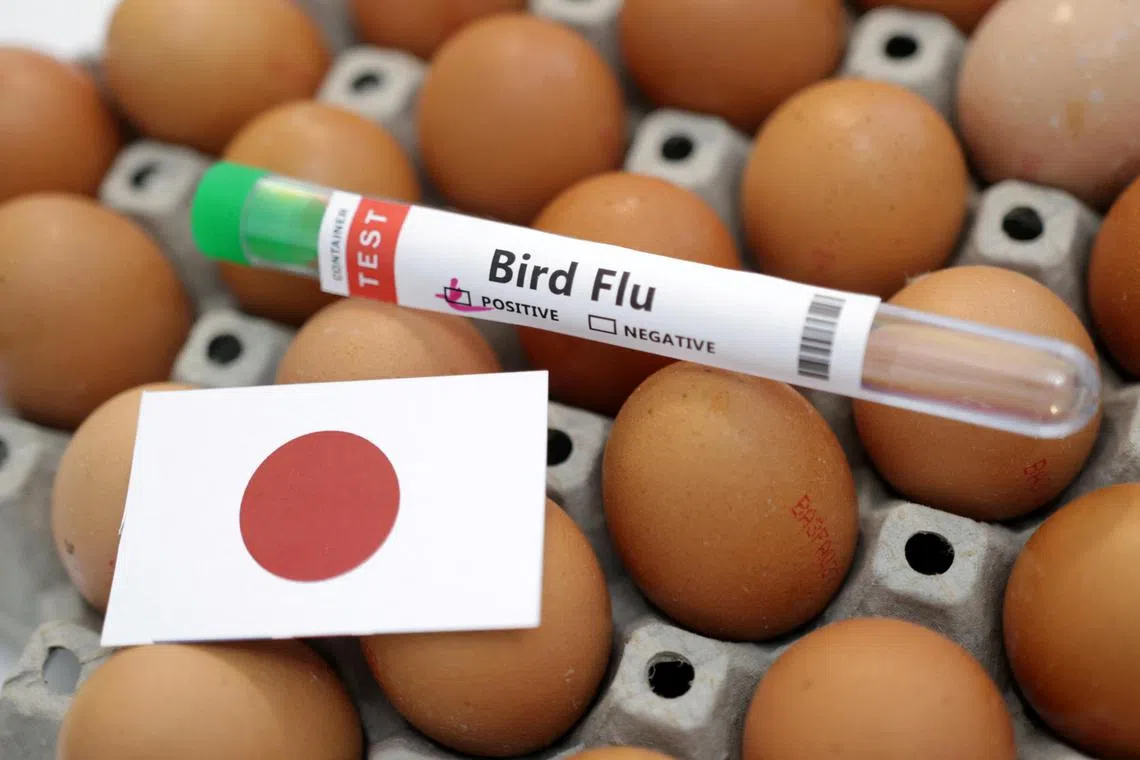Eggs off some menus in Japan as country hit by bird flu and egg shortage
Sign up now: Get insights on Asia's fast-moving developments

28 restaurant giants have decided to suspend egg dishes including chawanmushi, pancakes and Chinese food.
PHOTO: REUTERS
Looking for chawanmushi and tamagoyaki when in Japan? You may be disappointed.
Diners at some restaurants in Japan may not be able to order their favourite dishes that contain eggs due to an egg shortage, as the country battles with its worst outbreak of avian influenza.
About 30 per cent of 100 listed companies in Japan’s restaurant industry have suspended parts of their menu that use eggs from 2023, according to a survey by credit research firm Teikoku Databank on April 6.
Quoting the survey, Mainichi Shimbun daily reported that as at April 5, 28 restaurant giants have decided to suspend egg dishes including chawanmushi (a savoury steamed egg custard), pancakes and Chinese food.
The number of restaurant giants which have suspended eggs from their menus has increased by 10 from March, said the report.
Without stating specific restaurants, the report said that the main reasons for suspending the use of eggs were due to “soaring prices” and a “severe egg shortage”.
In the first three months of 2023, some big names in the food industry have taken steps to combat the egg shortage situation in Japan.
Avian influenza, also known as bird flu,
The avian influenza outbreak has resulted in Japan culling more than 17 million, or about 9 per cent, of egg-laying hens since the bird flu season began in the country in October 2022.
In January, Seven & i Holdings’ 7-Eleven chain, one of the many chain convenience stores across Japan, suspended the sale of some egg products. Other measures included using vegetables instead of eggs in its tuna sandwiches.
Then in February, Japanese casual restaurant chain operator Skylark Holdings began suspending sales of some menu items that use eggs, including the fried egg topping at its steak restaurants and fried rice at its Chinese food restaurant chain.
In March, McDonald’s Japan said it may have to suspend the sale of its popular Teritama burgers – comprising teriyaki patty and egg – during peak periods.
Although McDonald’s has managed to diversify its egg sources to not impact its regular offerings, the fast food chain spokesman Jonathan Kushner told the BBC that it was “watching the situation carefully”.
The issue is simply that supply in the country is unstable, said the report.
“It is hard to predict what the situation will be like in the summer and the fall (autumn),” Mr Kushner said.
Others like seafood giant Nissui Corporation makes a tamagoyaki – a Japanese rolled omelette – from Alaskan pollack, reported the BBC.
The product, which has been on its shelves since the second half of 2022, is developed to meet the needs of consumers with egg allergies.
Mr Tetsuya Lida, the company’s spokesman, told the BBC that the product had never been a “big-selling product”.
However, the company has seen a fivefold increase in supermarket shipments in 2023.
The bird flu crisis and egg shortage situation have also sent egg prices soaring.
The BBC reported on Thursday that wholesale egg prices in Japan have spiked more than 70 per cent in the past year according to data from one local egg seller.
For example, a kilogram of medium-size eggs now costs about 350 yen (S$3.50), said JA. Z-Tamago, a unit of the National Federation of Agricultural Cooperative Associations, in the BBC report.
Japanese condiment-maker Kewpie, which uses eggs as a key ingredient in its products, is raising prices by up to 21 per cent from April.
Japan is not the only country grappling with the bird flu crisis and it is also hitting countries such as the United States and Europe.



